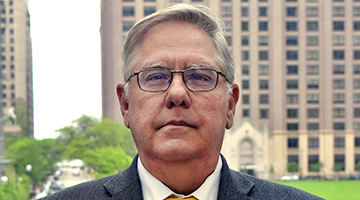Forensic Psychiatry
Forensic psychiatry deals with the interface of mental health issues and the law. This includes matters of civil, criminal and administrative law as well as evaluation and specialized treatment of individuals involved with the legal system at a variety of levels, including those incarcerated in jails, prisons and forensic psychiatric hospitals. Forensic psychiatry is formally recognized as a subspecialty by the American Board of Psychiatry and Neurology, which offers added qualifications and board certification in this field.
Division Leadership

Stephen Dinwiddie, MD
Chief of Forensic Psychiatry
Forensic Psychiatry Education
Our faculty members provide training in civil, criminal, clinical, consultative and correctional forensic psychiatry to forensic faculty, residents and medical students. Our goal is to enable psychiatrists to understand and effectively engage with the legal system and provide ethical, quality and timely professional expert services in a wide variety of civil and criminal forensic evaluations.
The forensic teaching staff consists of forensic psychiatrists, psychiatrists, forensic psychologists, psychologists and attorneys, including law enforcement personnel. Teaching activities involve case consultation, peer review and didactic seminars. The psychiatry resident seminars cover topics in civil and criminal law as well as forensic psychiatry that are pertinent to the practicing forensic psychiatrist.
Forensic Psychiatry Research
The Department of Psychiatry & Behavioral Sciences features several nationally recognized research programs. Forensic psychiatry fellows have opportunities for supervised participation in funded research projects. Visit our Research page to learn more.